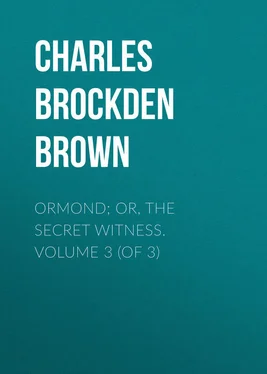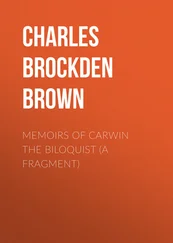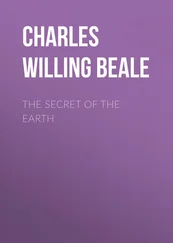Charles Brown - Ormond; Or, The Secret Witness. Volume 3 (of 3)
Здесь есть возможность читать онлайн «Charles Brown - Ormond; Or, The Secret Witness. Volume 3 (of 3)» — ознакомительный отрывок электронной книги совершенно бесплатно, а после прочтения отрывка купить полную версию. В некоторых случаях можно слушать аудио, скачать через торрент в формате fb2 и присутствует краткое содержание. Жанр: foreign_antique, foreign_prose, на английском языке. Описание произведения, (предисловие) а так же отзывы посетителей доступны на портале библиотеки ЛибКат.
- Название:Ormond; Or, The Secret Witness. Volume 3 (of 3)
- Автор:
- Жанр:
- Год:неизвестен
- ISBN:нет данных
- Рейтинг книги:4 / 5. Голосов: 1
-
Избранное:Добавить в избранное
- Отзывы:
-
Ваша оценка:
- 80
- 1
- 2
- 3
- 4
- 5
Ormond; Or, The Secret Witness. Volume 3 (of 3): краткое содержание, описание и аннотация
Предлагаем к чтению аннотацию, описание, краткое содержание или предисловие (зависит от того, что написал сам автор книги «Ormond; Or, The Secret Witness. Volume 3 (of 3)»). Если вы не нашли необходимую информацию о книге — напишите в комментариях, мы постараемся отыскать её.
Ormond; Or, The Secret Witness. Volume 3 (of 3) — читать онлайн ознакомительный отрывок
Ниже представлен текст книги, разбитый по страницам. Система сохранения места последней прочитанной страницы, позволяет с удобством читать онлайн бесплатно книгу «Ormond; Or, The Secret Witness. Volume 3 (of 3)», без необходимости каждый раз заново искать на чём Вы остановились. Поставьте закладку, и сможете в любой момент перейти на страницу, на которой закончили чтение.
Интервал:
Закладка:
This project was now communicated to Constantia. Every argument adapted to influence her choice was employed. He justly conceived that the only obstacle to her adoption of it related to Ormond. He expatiated on the dubious character of this man, the wildness of his schemes, and the magnitude of his errors. What could be expected from a man, half of whose life had been spent at the head of a band of Cossacks, spreading devastation in the regions of the Danube, and supporting by flagitious intrigues the tyranny of Catharine, and the other half in traversing inhospitable countries, and extinguishing what remained of clemency and justice by intercourse with savages?
It was admitted that his energies were great, but misdirected, and that to restore them to the guidance of truth was not in itself impossible; but it was so with relation to any power that she possessed. Conformity would flow from their marriage, but this conformity was not to be expected from him. It was not his custom to abjure any of his doctrines or recede from any of his claims. She knew likewise the conditions of their union. She must go with him to some corner of the world where his boasted system was established. What was the road to it he had carefully concealed, but it was evident that it lay beyond the precincts of civilized existence.
Whatever were her ultimate decision, it was at least proper to delay it. Six years were yet wanting of that period at which only she formerly considered marriage as proper. To all the general motives for deferring her choice, the conduct of Ormond superadded the weightiest. Their correspondence might continue, but her residence in Europe and converse with mankind might enlighten her judgement and qualify her for a more rational decision.
Constantia was not uninfluenced by these reasonings. Instead of reluctantly admitting them, she somewhat wondered that they had not been suggested by her own reflections. Her imagination anticipated her entrance on that mighty scene with emotions little less than rapturous. Her studies had conferred a thousand ideal charms on a theatre where Scipio and Cæsar had performed their parts. Her wishes were no less importunate to gaze upon the Alps and Pyrenees, and to vivify and chasten the images collected from books, by comparing them with their real prototypes.
No social ties existed to hold her to America. Her only kinsman and friend would be the companion of her journeys. This project was likewise recommended by advantages of which she only was qualified to judge. Sophia Westwyn had embarked, four years previous to this date, for England, in company with an English lady and her husband. The arrangements that were made forbade either of the friends to hope for a future meeting. Yet now, by virtue of this project, this meeting seemed no longer to be hopeless.
This burst of new ideas and now hopes on the mind of Constantia took place in the course of a single hour. No change in her external situation had been wrought, and yet her mind had undergone the most signal revolution. Tho novelty as well as greatness of the prospect kept her in a state of elevation and awe, more ravishing than any she had ever experienced. Anticipations of intercourse with nature in her most august forms, with men in diversified states of society, with the posterity of Greeks and Romans, and with the actors that were now upon the stage, and, above all, with the being whom absence and the want of other attachments had, in some sort, contributed to deify, made this night pass away upon the wings of transport.
The hesitation which existed on parting with her father speedily gave place to an ardour impatient of the least delay. She saw no impediments to the immediate commencement of the voyage. To delay it a month, or even a week, seemed to be unprofitable tardiness. In this ferment of her thoughts, she was neither able nor willing to sleep. In arranging the means of departure and anticipating the events that would successively arise, there was abundant food for contemplation.
She marked the first dawnings of the day, and rose. She felt reluctance to break upon her father's morning slumbers, but considered that her motives were extremely urgent, and that the pleasure afforded him by her zealous approbation of his scheme would amply compensate him for this unseasonable intrusion on his rest. She hastened therefore to his chamber. She entered with blithesome steps, and softly drew aside the curtain.
CHAPTER III
Unhappy Constantia! At the moment when thy dearest hopes had budded afresh, when the clouds of insecurity and disquiet had retired from thy vision, wast thou assailed by the great subverter of human schemes. Thou sawest nothing in futurity but an eternal variation and succession of delights. Thou wast hastening to forget dangers and sorrows which thou fondly imaginedst were never to return. This day was to be the outset of a new career; existence was henceforth to be embellished with enjoyments hitherto scarcely within the reach of hope.
Alas! thy predictions of calamity seldom failed to be verified. Not so thy prognostics of pleasure. These, though fortified by every calculation of contingencies, were edifices grounded upon nothing. Thy life was a struggle with malignant destiny, – a contest for happiness in which thou wast fated to be overcome.
She stooped to kiss the venerable cheek of her father, and, by whispering, to break his slumber. Her eye was no sooner fixed upon his countenance, than she started back and shrieked. She had no power to forbear. Her outcries were piercing and vehement. They ceased only with the cessation of breath. She sunk upon a chair in a state partaking more of death than of life, mechanically prompted to give vent to her agonies in shrieks, but incapable of uttering a sound.
The alarm called her servants to the spot. They beheld her dumb, wildly gazing, and gesticulating in a way that indicated frenzy. She made no resistance to their efforts, but permitted them to carry her back to her own chamber. Sarah called upon her to speak, and to explain the cause of these appearances; but the shock which she had endured seemed to have irretrievably destroyed her powers of utterance.
The terrors of the affectionate Sarah were increased. She kneeled by the bedside of her mistress, and, with streaming eyes, besought the unhappy lady to compose herself. Perhaps the sight of weeping in another possessed a sympathetic influence, or nature had made provision for this salutary change. However that be, a torrent of tears now came to her succour, and rescued her from a paroxysm of insanity which its longer continuance might have set beyond the reach of cure.
Meanwhile, a glance at his master's countenance made Fabian fully acquainted with the nature of the scene. The ghastly visage of Mr. Dudley showed that he was dead, and that he had died in some terrific and mysterious manner. As soon as this faithful servant recovered from surprise, the first expedient which his ingenuity suggested was to fly with tidings of this event to Mr. Melbourne. That gentleman instantly obeyed the summons. With the power of weeping, Constantia recovered the power of reflection. This, for a time, served her only as a medium of anguish. Melbourne mingled his tears with hers, and endeavoured, by suitable remonstrances, to revive her fortitude.
The filial passion is perhaps instinctive to man; but its energy is modified by various circumstances. Every event in the life of Constantia contributed to heighten this passion beyond customary bounds. In the habit of perpetual attendance on her father, of deriving from him her knowledge, and sharing with him the hourly fruits of observation and reflection, his existence seemed blended with her own. There was no other whose concurrence and council she could claim, with whom a domestic and uninterrupted alliance could be maintained. The only bond of consanguinity was loosened, the only prop of friendship was taken away.
Читать дальшеИнтервал:
Закладка:
Похожие книги на «Ormond; Or, The Secret Witness. Volume 3 (of 3)»
Представляем Вашему вниманию похожие книги на «Ormond; Or, The Secret Witness. Volume 3 (of 3)» списком для выбора. Мы отобрали схожую по названию и смыслу литературу в надежде предоставить читателям больше вариантов отыскать новые, интересные, ещё непрочитанные произведения.
Обсуждение, отзывы о книге «Ormond; Or, The Secret Witness. Volume 3 (of 3)» и просто собственные мнения читателей. Оставьте ваши комментарии, напишите, что Вы думаете о произведении, его смысле или главных героях. Укажите что конкретно понравилось, а что нет, и почему Вы так считаете.












